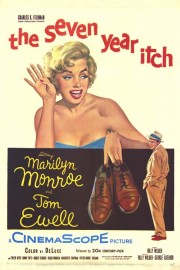The Seven Year Itch
Billy Wilder is one of the rare filmmakers who was capable of going between several different genres while also having a distinct voice. Whether you’re discussing “Some Like It Hot,” “Double Indemnity,” “One Two Three” or “Sunset Boulevard,” Wilder had a wickedly funny streak that enhanced every film, regardless of the subject. Compared to those films, “The Seven Year Itch” is silly and inconsequential, but it’s still a devious piece of entertainment, largely thanks to the presence of Marilyn Monroe.
Wilder based his film on a play by George Axelrod, who co-wrote the script with Wilder. The title comes from a psychological term that refers to the idea that after seven years of marriage, partners are less interested in monogamous relationships. The idea gets into the mind of Richard Sherman (Tom Ewell), a married executive at a publishing office, while he is reading a psychological manuscript his company is looking to publish. His wife and son are vacationing in Maine for the summer while he stays in the city to work. He’s waiting for his wife to call him at 10pm when he starts to imagine a conversation with her. He resents her checking in on him while also assuring her she has no reason to doubt his fidelity. We then see him recounting times he fended off advances from women, and we see how outrageous his imagination is. It’s only going to get more outrageous when fate (ok, a fallen tomato plant) leads him to meet the woman living upstairs for the summer (Monroe). Richard’s imagination really goes off the deep end when he starts spending time with her, and he’s feeling that seven year itch big time. The question is, will he scratch it?
In the ’70s, Wilder evidently said that “The Seven Year Itch” was a “nothing picture.” His reason was because the Hollywood Production Code of the time forbade him to show actual adultery, thereby making the film less impactful than it might have been otherwise. There is some truth to that, but it the film, however frivolous, is still quite entertaining thanks to the performances by the leads, and Wilder and Axelrod’s clever script. Monroe is vivacious and hilariously clueless in the role of “The Girl.” And Ewell sells Sherman’s imaginative streak and paranoia about the situation he finds himself in quite effortlessly, along with his realization at the end about how he truly feels about his family that keeps him from scratching his seven year itch. Wilder isn’t interested in a moral, though- this is all about giving his leading man, and the men in the audience, a chance to marvel at the physical perfection of Marilyn Monroe for 100 minutes. I can live with that.










